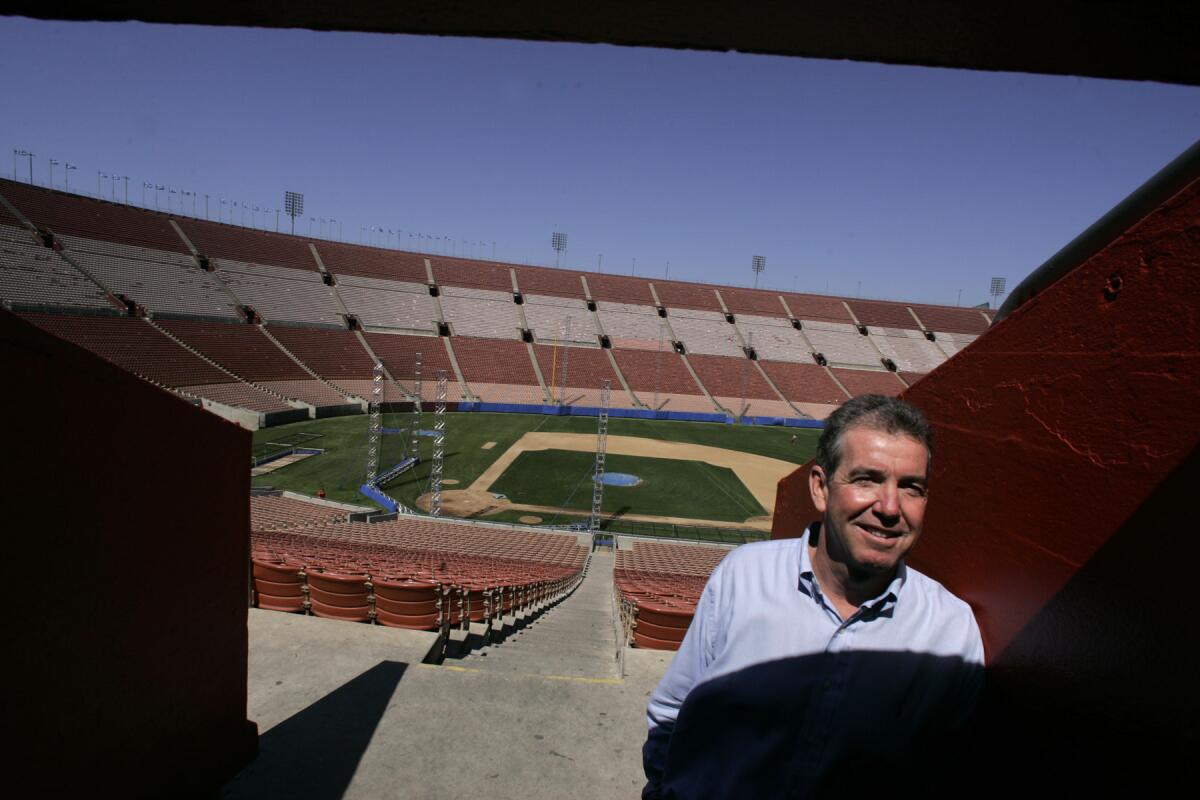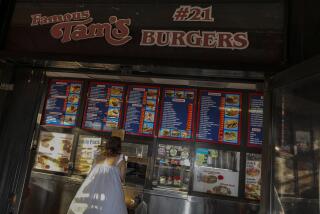Ex-Coliseum official received payments from stadium contractor

Patrick Lynch, while serving as general manager of the Los Angeles Memorial Coliseum, received hundreds of thousands of dollars from a stadium contractor who deposited the money in a Miami bank, according to interviews and documents.
The contractor, Tony Estrada, told Coliseum attorneys that the money came from an increase in his billing rate for janitorial services approved by Lynch, according to sources who requested anonymity because of the sensitivity of the issue.
Estrada said he paid Lynch about $1 per hour per janitor for roughly 4 1/2 years, according to the sources.
Lynch’s attorney, Tony Capozzola, acknowledged in response to inquiries from The Times that his client had received the money but said that it had nothing to do with stadium operations. “He did not receive kickbacks,” Capozzola said.
He said Estrada made the payments to buy an interest in a boat that Lynch owned and a second boat that they planned to purchase together.
“It was a private business matter, and they were buying the boat and they were spending a lot of money repairing a boat,” Capozzola said.
He said Lynch now realizes that he should not have had any personal financial dealings with Estrada.
“He’s very remorseful,” Capozzola said. “He should have never had a boat deal with the guy. He’s sad about it.”
The Estrada revelations are the latest in an eight-month financial scandal that has rocked the taxpayer-owned Coliseum and left its future in doubt.
The district attorney’s office and state Fair Political Practices Commission have launched separate investigations into possible conflicts of interest at the historic stadium, the site of two Summer Olympics and home to USC football.
Estrada’s claims are the first to allege improper payments to Lynch, who managed the Coliseum for 17 years before resigning in February after the announcement of the investigations.
Coliseum officials were told that more than $300,000 was paid to Lynch starting in 2006, according to the sources.
Capozzola confirmed that the amount “could be around $300,000” and that the Miami bank statements were mailed to a town house Estrada owned there. The statements were for an account under Lynch’s name, Capozzola also confirmed. He said Lynch occasionally reimbursed Estrada for boat expenses.
The payments came to the attention of a few Coliseum officials last year after Estrada and Lynch had a falling-out, the sources said.
Estrada spoke with a member of the Coliseum Commission and was directed to the county counsel’s office, which then had a private lawyer investigate, according to the sources. To support his story, Estrada provided canceled checks and other account information, the sources said.
Coliseum Commission President David Israel declined to discuss the specifics of Estrada’s claims but confirmed that an investigation took place.
“The allegations became known to the commission,” he said. “The commission investigated them and turned over the results to the district attorney. If the allegations are true, then the Coliseum is the victim of a crime.”
Estrada, who stopped working at the Coliseum several months ago, would not comment about the payments. But in an earlier interview with The Times, he said that Lynch asked to have a corporation set up for him so he could eventually take over Estrada’s janitorial company. The corporation was called Amusement Events Services, according to Estrada.
A Los Angeles accountant, Carlos Chait, said he incorporated the company for Lynch on Estrada’s orders. California secretary of state records show that it was established in June 2006 and dissolved about five months later. The incorporation documents did not list the name of any owners or officers.
Capozzola said Estrada’s allegations were designed “to get revenge” after Lynch refused to intervene in a Coliseum workers’ compensation case against Estrada’s company, Services for All Events.
He said that Lynch and Estrada had talked about possible business ventures, but Lynch had no intention of going into janitorial contracting.
“Pat Lynch has never been involved in any way with any company named Amusement Events nor any similar named entity,” the attorney wrote in an email. “He has never authorized anyone to use his name in connection with any such company.”
The money Lynch received was exclusively for boating, Capozzola said. He said Estrada agreed to pay part of the mortgage, marina fees and other expenses for Lynch’s boat, Wild Rose, which is moored in Southern California. In addition, Capozzola said, Estrada deposited more money toward the purchase of a second boat.
“This was not only about the boat expenses,” Capozzola said. “But they were going to be buying another boat that was going to cost about 200 grand.”
He said the money was deposited in the Miami bank because Lynch happened to be in Florida attending the Super Bowl when Estrada proposed the boat purchase.
“They were palling around one night,” Capozzola explained. “Estrada said, ‘Let’s open an account here and we will put money in it to buy a new boat.’”
Estrada said he made some payments to Lynch in the months before they opened the account, according to the sources. Capozzola said that money would have been for boat costs as well.
He said Lynch and Estrada did not buy a second boat and he did not know how much money, if any, remained in the Miami bank.
The Estrada allegations raise more questions about the management of the stadium, which has been facing financial troubles.
The Coliseum Commission -- made up of political appointees from the city, county and state -- has been unable to pay for renovations to the stadium promised in its lease with USC. As a result, the commission is seeking a new lease that could give the university day-to-day control of the Coliseum.
Amid the turmoil, two of the nine commissioners -- developer Rick Caruso and attorney W. Jerome Stanley -- recently left the board, citing, in part, its clumsy structure and ineffectiveness.
The Times, based on public records and interviews, has reported that two firms run by the Coliseum’s then-events manager, Todd DeStefano, collected at least $1.8 million in payments from concert promoters and other companies that did business at the stadium and companion Sports Arena. Lynch had approved DeStefano’s arrangement with one of the promoters, according to interviews.
After the initial report on DeStefano’s business dealings, the district attorney’s office and state Fair Political Practices Commission announced that they were starting investigations.
Based on material obtained under the California Public Records Act, The Times has also reported that another Coliseum manager, Leopold Caudillo Jr., directed stadium business to a firm he founded, and that executives -- including Lynch, DeStefano and finance director Ronald Lederkramer -- billed the government for thousands of dollars in luxury car expenses, gasoline purchases and other perks.
In 2009, Lynch transferred title of a Coliseum-bought Cadillac to himself, according to the records.
Caudillo and DeStefano have said they did nothing wrong.
The Times’ reports have also prompted City Controller Wendy Greuel to begin an audit of the Coliseum.
paul.pringle@latimes.com
ron.lin@latimes.com
andrew.blankstein@latimes.com
More to Read
Start your day right
Sign up for Essential California for news, features and recommendations from the L.A. Times and beyond in your inbox six days a week.
You may occasionally receive promotional content from the Los Angeles Times.








